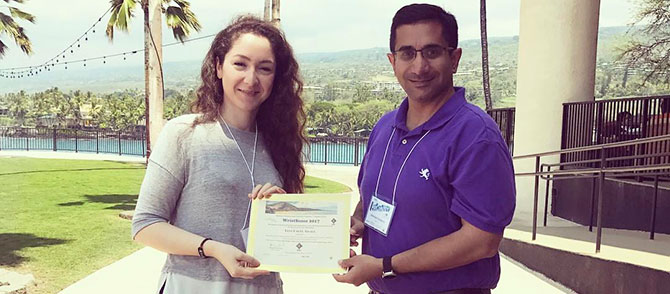Begum Egilmez Wins Best Paper Award at IEEE PerCom: WristSense 2017
The goal of this work is to build a novel stress model that can detect subjective stress using wrist-worn sensors, and compare them to more widely used off-the-shelf devices.

EECS Ph.D. Student Begum Egilmez has been awarded the Samsung Pay Best Paper Award for her research, titled “UStress: Understanding College Student Subjective Stress Using Wrist-Based Passive Sensing” at the 3rd WristSense Workshop on Sensing Systems and Applications Using Wrist Worn Smart Devices, co-located with IEEE PerCom at Kona, Big Island, Hawaii, held March 13-17, 2017.
The Samsung Pay award is given to the best paper presented at the workshop to acknowledge and encourage excellence in research. The awardee is presented with a certificate and a Samsung Gear at the workshop. Her work is a collaborative research effort between the NU EECS Dept. and the NU Dept. of Preventive Medicine, specifically between Microarchitecture Lab graduate students Egilmez, Emirhan Poyraz, and Wenting Zhou with Prof. Gokhan Memik, Prof. Peter Dinda, and Prof. Nabil Alshurafa.
The goal of this work is to build a novel stress model that can detect subjective stress using wrist-worn sensors, and compare them to more widely used off-the-shelf devices. To achieve this goal, several experiments are conducted where the participants performed stress-inducing activities such as the sing-a-song test (singing publicly in a crowd), which proved to be most stress inducing, while their physiological traits such as skin resistance and heart rate are measured using various devices (including a commercial smartwatch and a smartwatch-like platform built in-house). Features are then extracted from these readings and fed into our model to predict stress in college students. The results show that wrist-based wearable sensors are at least as good as their non-wrist counterparts and can even outperform them. Also, the results revealed that the novel model can achieve up to 88.8% f-measure in detecting stress during these activities. In the future, the group intends to validate the stress model in free-living populations, in the wild.
Advised by Prof. Memik, Egilmez's research is shaped around smartphone architecture and main goal is to improve user satisfaction in smartphones. The Microarchitecture Research Group's research is on holistic computer architectures. Specifically, work on understanding the effects of applications, users, and underlying technologies on architectures and vice versa. These efforts include incorporating holistic effects into architecture design process (for example, investigating the impact of architectures on users, utilizing biological information to make architectural decisions, estimating profitability of a design); application-specific processors (for example, architectures and compilers for networking, security, and data mining); and physical-aware architectures (architectures for minimizing the power consumption, reducing operating temperatures, and mitigating the effects of process variations).
The main goal of the WristSense 2017 workshop is to bring together researchers and practitioners to share innovative ideas, discuss challenges, and brainstorm potential solutions to open research problems related to the domain of wrist worn smart devices. Using sensors, computation resources, and communication interfaces available on smart watches and smart bands, it is possible to capture information about the device user, perform computation to infer the user’s activities and their context, and communicate these to a smartphone or the cloud. These wrist worn smart devices represent a perfect platform to conduct research on human activity and behavior. They introduce opportunities for exploring new research problems, such as efficient classification and computation on the wearable device, offloading of computation from the user’s watch to the phone or the cloud, enhancement of user experience, smart notification management, physical activity sensing, behavior modeling, and data analysis.
